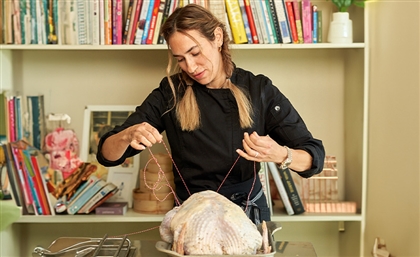Taming the Intercultural Beast
This week, Nadia El-Awady talks about some of the serious challenges intercultural couples face. Such as food quantities.

For years I’ve been telling people that I think intercultural marriages are a huge mistake. Intercultural marriages are doomed, I’d tell them. The differences, especially in the case of an Arab marrying a Western non-Arab, are too large. I’d tell people that no matter how open and liberal we Arabs seem to be in the beginning of a relationship, we always end up reverting to the rural version of ourselves; the farmer in us or the fallah.
I was saying this from experience. I am the product of one of the worst intercultural marriages – and hence one of the ugliest intercultural divorces – of all time. Take my parents’ story and compare it to all others in this world and it will rank at the very top with nightmare. And theirs wasn’t the only one I had witnessed. We were surrounded by intercultural marriages and not a one I can recall succeeded. So I know what I’m talking about.
And do I take my own valuable advice? No. Life wouldn’t be exciting if I did. I can give out really crappy advice sometimes and if anyone knows that it’s me.
So I recently married a Brit. The real original kind. The kind that’s been British for generations and generations. Not the “I’m British but from Arab origin or I’m British but from Asian origin” kind. No sirree. I am married to a Brit of Scottish origin. The kind that when I stand next to him, my skin appears to be dark brown; me who Egyptians describe as being white and blonde (I’m neither). The kind that speaks like Braveheart. And man oh man, oh man is it sexy! You tell me how I could have resisted a sexy Braveheart accent? Well, I couldn’t! Hot blood runs through my veins just as much as the next woman.
So now, not only am I facing the trials and tribulations of going through marriage numero duo, never an easy task in the best of cases, this second marriage is fraught with the problems that occur when an Arab and a Westerner decide to join forces ’til death do us part. And it certainly may be the death of one or both of us.

Take, for example, one of the major sources of contention we’ve had from the very beginning of our marriage. Food. Colin eats three meals a day. In the morning, he eats porridge (oatmeal) with fruit and milk. In the early afternoon he’ll eat a salad or a sandwich. And in the evening he eats a small dinner that usually involves fish and some vegetables.
Now you tell me. Is that food? Is that food?? I can eat all of that in one meal! I remember the first time we had a home-cooked dinner together. He cooked. I was very impressed. Most Egyptian men I know don’t cook. Colin cooks all the time. I watched him put dainty amounts of food on plates that had been warmed in the oven (who warms plates??). I said nothing. I did not want to be impolite. It took only two more meals like that and I told him to cook larger quantities and to let me put my own food on the plate. I wanted to eat. He watched in horror as I dumped a large pile of rice and a huge piece of meat on my plate. When I finished my meal I said what any normal Egyptian says after eating the way any normal Egyptian would, “I’m so full I can’t breathe!” “Why would anyone ever eat so much food that they couldn’t breathe?” Colin asked me incredulously. “That’s how you’re supposed to eat!” is my reply. “You’resupposed to eat until you’re full!” Of course, somewhere deep down inside – somewhere the Egyptian in me has hidden so far away it’s difficult for the other me’s to find – I know that human beings aren’t supposed to put so much in their stomachs that it affects their breathing and their general activity levels for hours afterwards. I also know that the Prophet Muhammed, peace be upon him, told us that we should only eat the amount of food that will keep us going and if we were to eat more we should fill only one third of our stomach with food, and another third with liquid, and leave the last third for breathing. I know that. But the Egyptian in me will not acknowledge it. I want to see lots of food on my plate. And I want to eat as much of it as I possibly can.
I started doing the cooking at home when I felt that the Colin cooking wasn’t going the way I needed it to. The amounts were too small and the food was just too healthy. I need butter in my cooking sometimes. I need salt in my food. I need copious quantities of tomato sauce with my meat and veggies. I need a huge pile of rice with every meal and there’s no reason for that not to be accompanied with some bread and/or potatoes. One sort of carbohydrate does notdisqualify the other from being included in the same meal. Where do people get these rules?? So I spent a full day in the kitchen – like a proper Egyptian wife would – cooking and baking and thinking my husband won’t be able to live without me after this. And do I get appreciation? No. Most of the food doesn’t get eaten to begin with. And Colin’s rule is if you cook it you have to eat it. “How am I going to eat all that??” I ask. “Why did you cook all that??” he replies. Of course by then my feelings are hurt and I’m crying and Colin is beside himself trying to figure out what he’s done wrong.
I wonder if any intercultural couples have cited food as grounds for divorce?
- Previous Article I Got Banged!
- Next Article Dalia Does…Feminism
























